Jesus Christ is the central figure of Christianity and one of the most influential figures in the development of western society.

Due to lack of accurate historical records, there is some dispute over the exact details of his life, and teachings. The most widely used sources are the four canonical gospels – Matthew, Mark, Luke and John. It is estimated that these were written over 70-200 years after the death of Christ. There are also many other non-canonical gospels such as Thomas, Peter and Mary. Of particular interest was the discovery of the dead sea scrolls, which uncovered texts previously lost.
Jesus was born to Mary and Joseph of Nazareth. According to the gospel of Matthew and Luke, Jesus was born in a stable in Bethlehem. They also suggest Mary was a virgin and the birth was a miracle of the ‘Holy Spirit’
According to the Gospels, the birth of Jesus was proclaimed to shepherds in nearby fields. Later on Jesus was visited by three wise men from the east offering gifts of gold, frankincense and myrrh.
Not much is known about Jesus’ early life, the Gospels concentrate on the last couple of years when he was active in his ministry. However, Jesus is believed to have followed in his father’s footsteps and trained to be a carpenter. Some have also suggested during this period Jesus travelled to India and Persia where he learned something of India’s spiritual tradition before returning to Nazareth to begin his ministry.
All three synoptic gospels say Jesus was baptised by John the Baptist, at the River Jordan. This symbolic baptism was the beginning of Jesus’ ministry.
Following his baptism, Jesus spent 40 days in the desert where he was tempted by the Devil. However, he passed the test and refused any temptations of wealth or worldly gain.
Jesus’s teachings were characterised by short pithy statements that used striking imagery to capture the imagination of listeners. His most famous teachings are the sermon on the mount.
Sermon on the Mount
Matthew 5
Blessed are the poor in spirit: for theirs is the kingdom of heaven.
Blessed are they that mourn: for they shall be comforted.
Blessed are the meek: for they shall inherit the earth.
Blessed are they which do hunger and thirst after righteousness: for they shall be filled.
Blessed are the merciful: for they shall obtain mercy.
Blessed are the pure in heart: for they shall see God.
Blessed are the peacemakers: for they shall be called the children of God.
Blessed are they which are persecuted for righteousness’ sake: for theirs is the kingdom of heaven.
Blessed are ye, when men shall revile you, and persecute you, and shall say all manner of evil against you falsely, for my sake.
—–
A key characteristic of Jesus’s teachings are an emphasis on forgiveness and unconditional love. These represented a departure from the old scriptures which emphasized an eye for an eye. Jesus taught his followers to ‘love their enemy’ and ‘turn the other cheek’
“But I tell you not to resist an evildoer. On the contrary, whoever slaps you on the right cheek, turn the other to him as well.” – Matthew 5:39
“Ye have heard that it hath been said, Thou shalt love thy neighbour, and hate thine enemy. But I say unto you, Love your enemies, bless them that curse you, do good to them that hate you, and pray for them which despitefully use you, and persecute you”. (Matthew 5:38-44)
Jesus Christ also taught that the Kingdom of heaven was within. To attain this state he taught it was important to be willing to give up attachment to the world and maintain humility and simplicity – to be like a child.
“The kingdom of God is not coming with signs to be observed; nor will they say, `Lo, here it is!’ or `There!’ for behold, the kingdom of God is in the midst of you (or “within you”) Luke 17:20
It was the radical nature of his teachings and a growing following which aroused the suspicions of the authorities.
Jesus was also known as a healer. The gospels recount many miracles where Jesus was able to heal the sick and even resurrect the dead (Lazarus)
In the last months of his life, Jesus entered into Jerusalem and was greeted enthusiastically by crowds who shouted ‘hosanna’. Jesus then entered the main temple and created controversy by overturning the tables of the money lenders; criticising them for conducting business in a sacred temple – claiming they had turned the temple into a ‘den of robbers’
Later that week he celebrated the Passover meal with his thirteen disciples. He foretold he would be betrayed by one of his own disciples and turned over to the authorities.
This later occurred. Judas betrayed Jesus to the temple authorities by kissing Jesus. Judas was paid 30 silver coins for his betrayal. But, he later repented of his action and hung himself from a tree.
The Jewish elders asked him if he was the Son of God. Jesus replied ‘It is as you say.’ The Jewish authorities passed him to the Roman authorities with the recommendation he be charged him with blasphemy. It is said Pontius Pilate was reluctant to have him executed as he didn’t see the crime against the Romans. His wife had a dream he which she felt him innocent and his wife tried to persuade Pilate to release Jesus. Pilate ordered Jesus to be flogged in the hope this would appease the Jewish authorities. However, they still wanted to see Jesus executed. On the feast of Passover, it was traditional for the Roman authorities to release one prisoner. However, the crowd chose not Jesus but Barabbas – a convicted criminal. Pilate washed his hands saying it was not his crime.
Jesus was then led up to the Calvary to be crucified. He had to carry a cross and at one stage fainted – and was helped by Simon of Cyrene.
The three synoptic gospels say that Jesus died on the cross, with a Roman soldier puncturing his side with a spear to prove that he was dead.
Nature of Jesus Christ
In the history of early Christianity there was much debate about the nature of Jesus Christ. Some felt Jesus was a direct incarnation of God, others felt he was both divine and human. There were different branches of Christianity emphasizing different aspects. For example, the Gnostics emphasized the immanence of God, and the ability for followers to have a direct relationship with God.
In 325 AD, the Nicene Creed formalised the Christian church teachings about Jesus. They accepted 4 gospels as canonical and rejected many other gospels. The Nicene creed also gave great emphasis to the writings and letters of St Paul. St Paul emphasized the divine nature of Jesus Christ and the importance of the crucifixion and resurrection.
Enlightenment views
Many key figures in the enlightenment / renaissance felt Jesus to be a supreme teacher of moral and religious ideals, but rejected claims to divinity and miracles such as the virgin birth. For example,
Thomas Jefferson wrote the ‘Life and Morals of Jesus Christ’ (known as the Jefferson bible.
Benjamin Franklin also looked to Jesus Christ as a great moral teacher, but, didn’t accept all the teachings of the Christian church.
In the Hindu / Indian tradition Jesus Christ is seen as a realised Spiritual Master. A person who has achieved self-realisation or God-realisation. Jesus Christ is also looked upon as an Avatar – a realised soul with a special mission to uplift a wide number of souls. Many Indian spiritual Master see Jesus Christ as divine an ‘incarnation of God’ But, do not accept that Jesus Christ was alone in achieving this spiritual realisation.
In Islamic tradition, Jesus Christ is seen as an important prophet of God.
COPIED BY: www.crazeguard.blogspot.com
 Muhammad was born in 570 CE in the Arabian city of Mecca. Orphaned from an early age, he was brought up by his uncle Abu Talib. In his early life, he worked as a merchant and shepherd. Muhammad had spiritual inclinations and would spend time going to caves around Mount Hira to spend time in silence, prayer and retreat.
Muhammad was born in 570 CE in the Arabian city of Mecca. Orphaned from an early age, he was brought up by his uncle Abu Talib. In his early life, he worked as a merchant and shepherd. Muhammad had spiritual inclinations and would spend time going to caves around Mount Hira to spend time in silence, prayer and retreat.
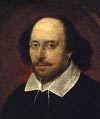



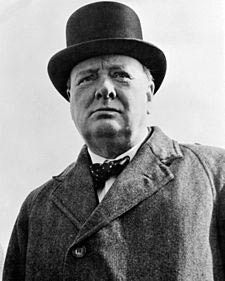 Sir Winston Churchill (30 November 1874 – 24 January 1965) was a British politician and author, best known as Prime Minister of the United Kingdom during the Second World War.
Sir Winston Churchill (30 November 1874 – 24 January 1965) was a British politician and author, best known as Prime Minister of the United Kingdom during the Second World War.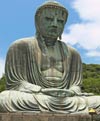

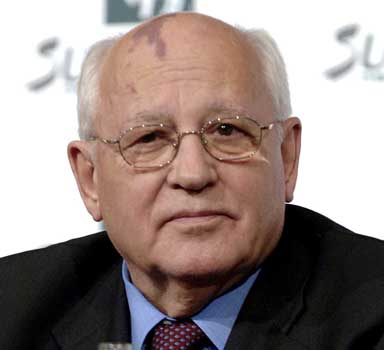 Gorbachev was born in March 1931 in Stavropol, the North Caucuses to a poor peasant family. At the age of 11, the district was occupied by the Germans for three years, a torrid time for all in the village. In 1950 he enrolled at Moscow university where he became a member of the Soviet Union Communist party. It was here that Gorbachev met his future wife,
Gorbachev was born in March 1931 in Stavropol, the North Caucuses to a poor peasant family. At the age of 11, the district was occupied by the Germans for three years, a torrid time for all in the village. In 1950 he enrolled at Moscow university where he became a member of the Soviet Union Communist party. It was here that Gorbachev met his future wife, 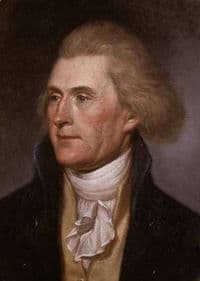 As a young child Thomas Jefferson was an enthusiastic student, often spending up to 15 hours a day studying. He was to retain a life long interest in reading. He had both a keen intellect and also a wide range of interests. His interests ranged from philosophy and architecture to the natural sciences. At the age of 16 he entered the College of William and Mary in Williamsburg, and two years later he graduated with the highest honours. After leaving college he became a lawyer and later served in the Virginian state Burgess. One of his earliest political writings of significance was A Summary View of the Rights of British America (1774). This expressed a thoughtful summary of a way America could make a settlement with Britain. It played an important role in shaping opinions in the lead up to the War of Independence.
As a young child Thomas Jefferson was an enthusiastic student, often spending up to 15 hours a day studying. He was to retain a life long interest in reading. He had both a keen intellect and also a wide range of interests. His interests ranged from philosophy and architecture to the natural sciences. At the age of 16 he entered the College of William and Mary in Williamsburg, and two years later he graduated with the highest honours. After leaving college he became a lawyer and later served in the Virginian state Burgess. One of his earliest political writings of significance was A Summary View of the Rights of British America (1774). This expressed a thoughtful summary of a way America could make a settlement with Britain. It played an important role in shaping opinions in the lead up to the War of Independence.



 Due to lack of accurate historical records, there is some dispute over the exact details of his life, and teachings. The most widely used sources are the four canonical gospels – Matthew, Mark, Luke and John. It is estimated that these were written over 70-200 years after the death of Christ. There are also many other non-canonical gospels such as Thomas, Peter and Mary. Of particular interest was the discovery of the dead sea scrolls, which uncovered texts previously lost.
Due to lack of accurate historical records, there is some dispute over the exact details of his life, and teachings. The most widely used sources are the four canonical gospels – Matthew, Mark, Luke and John. It is estimated that these were written over 70-200 years after the death of Christ. There are also many other non-canonical gospels such as Thomas, Peter and Mary. Of particular interest was the discovery of the dead sea scrolls, which uncovered texts previously lost.













